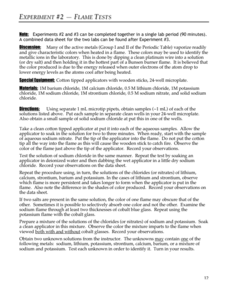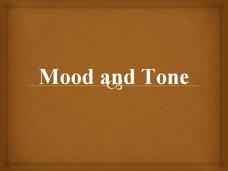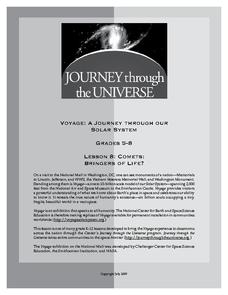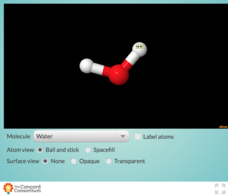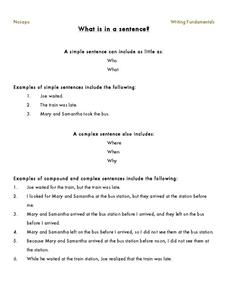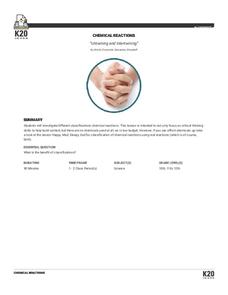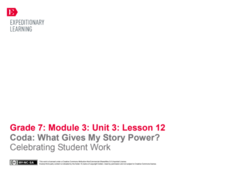Curated OER
I Spy Poetry
Explore the components of rhythm and form through a reading of Jean Marzollo's I Spy books. After discussing Marzollo’s format, the class agrees upon a theme for a class book and topics that fit with that theme. Pupils write a poem,...
Curated OER
Writing Diagnostics and Introduction to Literary Terms
Assess your new learners' writing abilities and knowledge of literary terms with these diagnostic activities. Part of a back-to-school unit, this is meant to provide the teacher with information about the ability levels of their class....
Pingry School
Flame Tests
Light a fire in your pupils! Scholars conduct a flame test and observe the emission spectra of several different salts in an enlightening hands-on investigation. They use their observations to make comparisons and conclusions about the...
Curated OER
Plot and Conflict in W.W. Jacob's "The Monkey's Paw"
Tenth graders analyze the use of literary elements in W.W. Jacob's "The Monkey's Paw." Literary analysis is accomplished by a review of the plot and order of events in the story. Learners work in pairs to match the events from the story...
Shoop English
Literature Terms Activity
Designed to be used with an independent reading book, this activity provides practice with identifying and explaining literary terms. While they read, individuals find instances of literary devices and elements in use in their books....
Curated OER
My Antonia: Concept Analysis
Use this analysis of My Antonia to help inform your instruction and prepare your pupils for the project and enrichment ideas listed at the end of the resource. The analysis covers big questions related to the text, themes, plot elements,...
Curated OER
Rosencrantz and Guildenstern Are Dead: Concept Analysis
Make sure you are well-informed before embarking on a study of Rosencrantz and Guildenstern Are Dead. This resource includes an analysis of the text that a teacher can use to prepare a unit of study. It covers plot elements, themes,...
Curated OER
Mini-Lesson Planning for Inferences
Making inferences and drawing conclusions is a key component to successful active reading. Encourage your class to use context clues and prior knowledge to infer different elements of a story, including the setting, plot, and character...
EngageNY
Grade 9 ELA Module 2, Unit 2, Lesson 3
The manipulation of time is one of the most essential elements in Sophocles' Oedipus the King. As your language arts class participates in a jigsaw discussion activity, they work together to analyze the play's plot structure and...
Plainfield Public School District
Mood and Tone
"It was a dark and stormy night. Perfect for making Christmas cookies." Distinguishing between the mood of a piece and the tone can be tricky, but with the help of this presentation viewers quickly see and are able to identify the...
Pinecrest Preparatory Middle and High School
Short Story Planning Guide
A short story is only as strong as its characters, development, and conflicts. Encourage the young authors in your class to plan their stories based on the elements of narrative writing, all provided in brainstorming graphic organizers.
Journey Through the Universe
Comets: Bringers of Life?
Young scientists investigate the elements found in our solar system and then construct a model of a comet. They apply their new knowledge to the formation of the solar system.
Concord Consortium
Elements and Polarity
Take a look at some molecules that are so cool, they're polar! Scholars examine the effect polarity has on a molecule's shape and charge. Change up the view and choose between an opaque or transparent molecular surface, complete with...
Curriculum Corner
Fairy Tale Unit of Study
What makes a fairy tale a fairy tale? Use a 27-page packet to supplement your next fairy tale unit. With sequencing activities, story map worksheets, character analyses and story elements graphic organizers, and fairy tale highlight...
Nosapo
What Is in a Sentence, Paragraph, and Story?
Language arts is made up of many parts. Learners review the parts of a sentence, as well as how to make a simple sentence into a complex sentence, before examining full paragraphs and identifying the topic, body, and concluding sentence...
K20 LEARN
Untwining And Intertwining: Chemical Reactions
What happened when the chemistry teacher told a bad joke? There was no reaction! A creative take on the traditional reaction types instructional activity invites learners to draw their own conclusions about how compounds and elements...
Mr. Mansour
Ralph S. Mouse by Beverly Cleary
Take an in-depth look into Beverly Cleary's story, Ralph S. Mouse, with a 10-question worksheet that focuses on story elements. Scholars describe the main character, point of view, conflict resolution, and more! Then, conclude with a...
Film Education
The Jungle Book
Accompany a viewing of Disney's live-action feature film, The Jungle Book, with a packet equipped with several activities focused on story elements. Scholars discuss and complete diagrams and charts about the movie's characters, setting,...
Pace University
Short Stories
A reading of Kevin Lamb's short story "Lost in the Woods" launches a study of how writers use elements such as foreshadowing, mood, character development, setting, and conflict to engage readers. Class members then demonstrate what they...
EngageNY
Discussing and Identifying Themes: What Makes a Good Children’s Book?
Working in small groups, scholars look closely at a children's book to evaluate narrative techniques. Next, they complete a Children's Book Scavenger Hunt worksheet to analyze the literary elements of their selected stories.
EngageNY
Coda: What Gives My Story Power? Celebrating Student Work
It's time for a celebration! Scholars go on a gallery walk around the classroom to view their peers' completed illustrated children's stories. Using sticky notes, pupils provide feedback about the powerful elements they find in their...
University of Colorado
Using Spectral Data to Explore Saturn and Titan
Saturn is really far away, but knowledge of its composition is within reach. Future astronomers learn how scientists use spectra to remotely determine the chemical composition of a planet or moon. They try out this concept by analyzing...
K20 LEARN
The Anatomy Of A Story: Story Structure
Somebody. Wanted. But. Then. Introduce your classes to the structure that supports stories with a instructional activity that teaches readers how to identify the four basic components writers use to craft their tales. After identifying...
Curated OER
Rhythm in Motion
Any age of elementary student can demonstrate their understanding of the connections of elements of art and music by creating their own slit song. You will investigate and study the Melanesian Slit Song with Kindergartners through Junior...
Other popular searches
- Story Elements
- Literary Elements
- Elements of Drama
- Elements of Art
- Elements of Poetry
- Periodic Table of Elements
- Narrative Elements
- Dance Elements
- Short Story Elements
- Elements of Design
- Fashion Design Elements
- Atoms and Elements




